Munich beer is famous and loved around the globe. The history of the Munich breweries and their beers is long and still today very present. The brand of Munich beer has a special ring but mostly a special taste to it. Today, more than ever, it brings millions of tourists every year from all over the world into the city. Where lies the root of this special ring and taste? What makes Munich breweries and Munich beer so outstanding? We will take a look at the tradition of brewing in Munich.
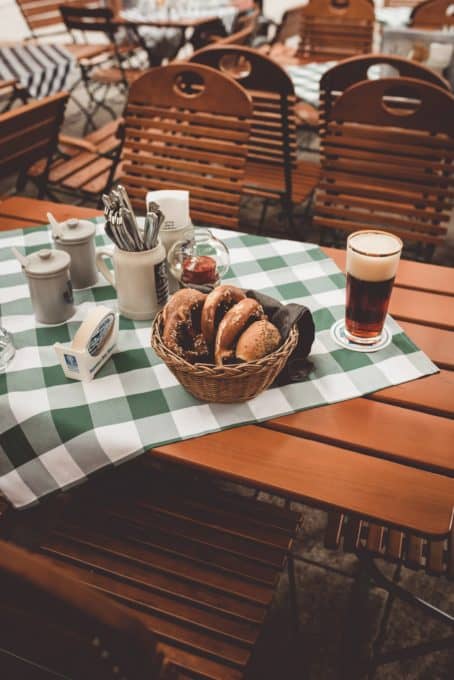
A History Of The Tradition Of Brewing In Munich
In Munich and in Bavaria Breweries existed for hundreds of years. Originally there were many different variations of form and organisation that breweries can take. The biggest breweries were always owned by nobility, the so called court-breweries or Hofbrauereien. Most of the nobles owned their own brewery, these supplied the court and the local pubs with beer.
Important in early beer brewing were the breweries of the monasteries. Here the monks originally only brew their own supplies, but over time started pouring beer to travelers, pilgrims and neighbors. This developed into quite the business, and the monastery pub often became the biggest source of income for the monks.
The third and only in numbers most widespread form of breweries were the so called “Kommunbrauereien”, which literally translate to “communal brewery”. Here the inhabitants of a village brewed their own personal supplies. These were very small breweries that didn’t sell beer.
Birth of Munich’s big breweries
This division of breweries into three categories originated in feudal society in medieval times and was only abolished in the early 19th century. In wake of secularization, the transfer of cleric property into the hands of worldly nobles, most of the monasteries’ breweries would be sold to private buyers. This development can be considered the birth of (big) business breweries. Today the Augustiner Brauerei is the only Munich brewery still owned by the same family that bought it back then.
In the 19th century deregulation happened in Bavaria. Regulations that used to control the quantity of beer served, the production procedures or the times it had to be sold were lifted or changed. Beer started to approach the status of the commercial trade good it has today.
When the Munich breweries became private property, they started developing into big companies.
Munich beer for export
The steam engine and a row of other technical innovations made it possible to control the exact amount of each ingredient and to massively increase the production volume. Brewing developed from supplying the city and its inhabitants into an industry.
At the end of the 19th century, thanks to industrialised cooling techniques, the transport over long distances was made possible. The invention of the beer bottle made it possible for “Löwenbräu” to become the biggest exporting brewery in Germany at the beginning of the 20th century.
The first brewery to design a logo and come up with a rudimentary corporate design was “Spaten”. They also ran advertising campaigns to promote their product. These ads not only marketed the beer and its taste but focused on the Munich way of life. The famous Munich beer not only owes its infamy to its quality but also to the reputation of the city where it was brewed. The city, on the other hand, owes its reputation, as the capital of beer, to the ad campaigns of this early beer industry. When Munich became a tourist hotspot, the huge beer halls of the breweries were drawing many tourists to the city and still are today. Two very interesting places are the “Hofbräukeller” and the “Paulaner Brauhaus”.
The “Reinheitsgebot” – Controlling The Purity Of Beer Since 1516?
The world sees the bavarian “purity law” or “Reinheitsgebot” which dictate what ingredients are allowed inside of a beer as a hallmark of quality. This hasn’t always been the case. In fact, it only earned its status in the middle of the 19th century when bavarian beer was already famous around the world.
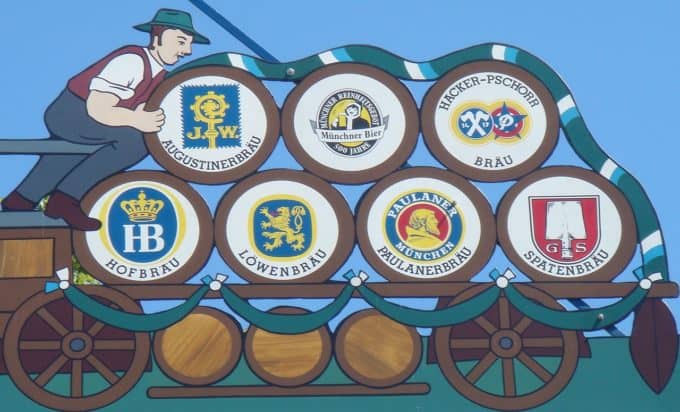
Though it was already law in Bavaria for many years, it was reinforced for the purpose of protecting the “nature of Bavarian beer” in the late 18-hundreds. The punishment for adding other ingredients than hop, yeast, malt and water or using cheap supplements was significantly increased due to the fact that breweries from other parts of Germany or the world were threatening to diminish the profits of Bavarian breweries.
The Munich Brewing Industry Today
There are hundreds more and there have been many more in the past, but these six breweries are the biggest, most well known, and have been existing for the past 300 years to shape the reputation of the city and its beer. All these breweries are present at the Oktoberfest but also have their traditional beer halls inside the city. These are a good stop for everybody coming to Munich thirsty!
Augustiner
Today situated in the city center on Landsberger Strasse, the brewery was once right outside the gates of the city. Inside the walls of the brewery complex is the Augustiner Pub where the fresh brew is served directly from the keg. Wherever you can buy beer in Munich, the supermarket, a kiosk or a gas station you will find the round brown bottles with the friendly monk on them. The Augustiner Hell might very well be the favorite beer of Munich, and Edelstoff can be found all around the globe.
Remarkably about the company is that they never ran a single ad campaign and nevertheless are one of the biggest Munich breweries. Advertisement by quality.
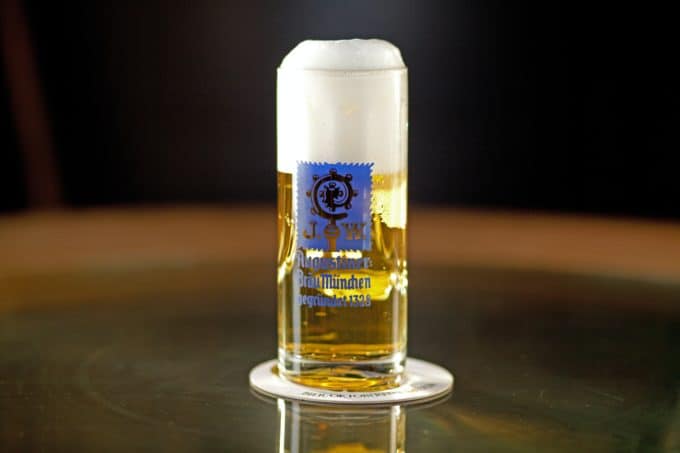
Hacker Pschorr
They used to be two, now they’re one again. In the late 19th century the married couple Hacker and Pschorr made it one of the most important breweries of the country, and their sons made them two of the most important breweries. As of 1972 the two have been united again and are brewing the same beer. Munich Insider Tipp: The Hacker Pschorr Radler is the best Radler made by a Munich brewery.
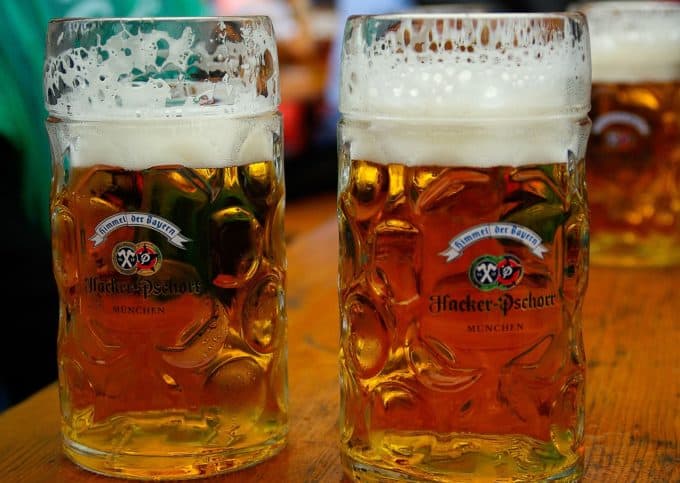
Hofbräuhaus
Once founded and run by the Bavarian monarch and his family, the brewery passed into state hands in 1939. Wherever this beer used to be manufactured, you can drink it now. The Hofbräuhaus am Platzl behind city hall and one of the most beautiful beer-gardens above the Hofbräukeller on Wiener Straße.
Löwenbräu
Löwenbräu is one of the first and for a long time the most successful export beers of Bavaria. Its brewery can be found just a five minute walk from the main train station (Hauptbahnhof) on Nymphenburger Strasse. The main attribute of the building are the glass walls through which you can see the huge bronze brew kettles. The Löwenbräukeller is right across the street and a good place to get the delicious Munich beer!
Paulaner
Have you ever heard of a brother barnabas? Maybe that rings a bell, but do you also know where you know him from? He is famous for being the monk that came up with the original Paulaner Doppelbock the Salvator. Back in 1634, when italian monks came to Munich, they couldn’t eat during fasting. Thus they brewed a very strong beer adhering to the slogan: “fluid bread doesn’t break the fasting”. Today Paulaner is mostly known for their very good commercials (Good. Better. Paulaner.) and their heavenly Spezi. Not to be forgotten, the Nockherberg once used to be the seat of the Paulaner Brewery and today is a famous beer-hall and event location.
Spaten
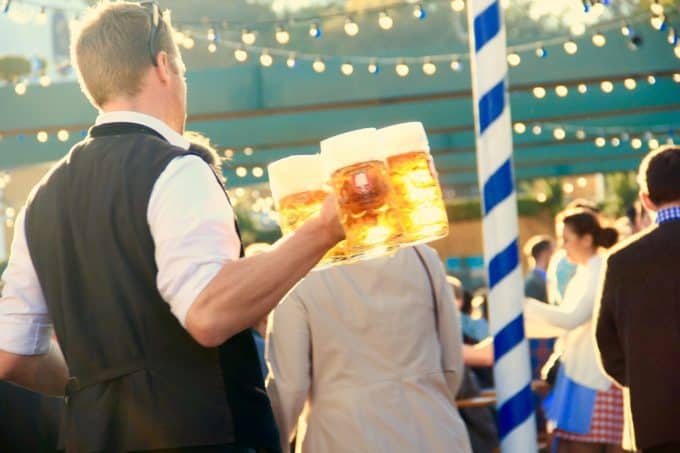
Spaten invented the corporate design for breweries. The most important achievement though is that they actually invented the Munich Hell, which later was copied in a region of Czechia named Pilsen which is today known as Pils. Spaten runs a tent on the Oktoberfest, the Schottenhammel, where every year the first keg is opened. Furthermore the classy Restaurant across from the opera on Max-Joseph-Platz is also supplied and partly owned by Spaten, it’s called the Spatenhaus.
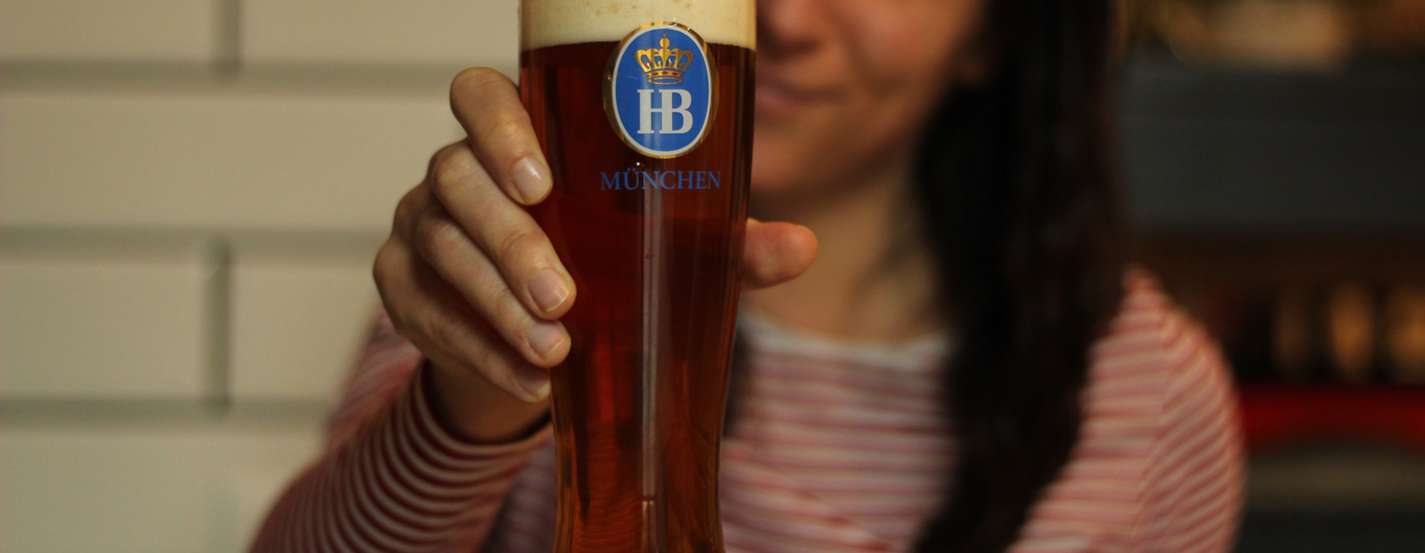
I was at the 1971 Octoberfest and have clay mugs from Schmidt-Brau Schwandorf. i cannot find that brewery anywhere in the literature. Any thoughts?
Hey there Tony,
I might have some thoughts on that actually: Neither did I find anything in literature about this specific brewery being at the Oktoberfest. To be honest it would very much surprise me, if they had been there as a brewery, as only Munich breweries are allowed to offer their beer there.
In this particular case of the Munich brewery it is very hard to obtain that status. Because, not even Giesing Bräu for example (which is very much in Munich) was classified as a Munich Brewery until some years ago.
So my best guess is that Schwandorf Bräu wasn’t offering their beer, but only their food. They will probably have served beer of another brewery, but in their own mugs. Which is (as far as I know) not illegal, as long as somewhere (prominently) it’s marked which beer it actually is.
I hope very much that I could help you! If you have any other questions feel free to ask again or contact me directly (Author’s Bio)!
Have a great day!
Quentin